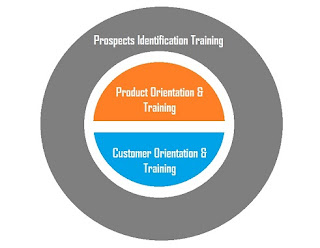Why Your Business Needs Customer Oriented Salespersons
In present day market, where customers have far more choices to choose from due to extreme homogeneity, consider the facts that over one million businesses starts in the united states alone each year (114 each hour) that excludes online start-ups (1)(2).
And out of those one million around 134,139 patents
are issued roughly to the same number of businesses while the rest of the
businesses are essentially “Me-Too’s (product/service)” numbering around
866,000 businesses (3).
Similarly there were around 125 million SME's world
wide in 132 economies back in 2010 (4). And in my opinion majority of these
businesses are “Me-Too’s (product/service)” too, considering the fact that nearly
50 percent of new products introduced in the market are complete failures and
more than 70 percent do not reach their sales goals (5).
This has resulted
in extreme homogeneity in products/services, extreme competition in the present
day market and excessive number of options to choose from (for customers).
Thus in present day
scenario SME’s have fewer options to compete like either they need to brand effectively to differentiate themselves from the rest, to standout in minds of their target
customers or to innovate effectively to lead, to be miles ahead from the
rest.
But the fact is
none of that is easy and most of the SME’s can’t afford those options, so the
next best alternative to all that is to forge
relationships with your target market, to have a long term relationship with
your customers. As long term relationships have been proven to deliver benefits
(according to studies & researches published in well known Journals) like
loyalty (6) and
customer satisfaction (7)(8).
And that’s what
everyone, every SME is looking for, customer loyalty and customer satisfaction
these days, isn’t it ?!
We all know, the better the relationship (with
your target customers), the more easy it will be for your business to compete
in present day market environment and due to that reason (along with several other), customer
relationship management (CRM) has been developed into an area of major
significance over the last decade or so (9).
And to complete the
picture, according to a study, salesperson’s who utilize customer oriented approach/strategy
in their dealing with potential customers are far more likely to develop long
term healthy relationship with their customers (10).
And we all know
salespeople are essential and significant part of any business, without
effective sale teams, salespersons your business won’t be able to compete, won’t
grow and would eventually fade out of the market (considering the increasing
competition, considering product/service increasing homogeneity etc...) even if
it doesn’t fade, it will be a mediocre and if you want mediocre then why bother
to read the article… ;p
Okay now let’s talk
about the next step, how to train/develop salespersons to make them customer
oriented.
How to Train/Develop Salespersons to make them Customer Oriented?
Well its easy, I mean
it’s not that hard if one wants to, one can surely do it. You need to train and
develop your sale teams, salespersons in terms of the following three things.
2. Product Orientation & Training
3. Customer Orientation & Training
Prospects Identification Training
When your sale
teams, salespersons knows exactly how to identify the right or potential
prospects, where to look, when to look and how to look for them.
You are required to
excessively train your sale teams, salespersons in order to achieve that. And
after training keep assessing and take necessary measures accordingly.
Product Orientation & Training
When your sale
teams, salespersons possess sufficient knowledge, technical know-how to
describe, demonstrate, present your product/service adequately to your
prospects.
Again you are
required to excessively train your sale teams, salespersons in order to achieve
that. And after training keep assessing and take necessary measures accordingly.
Such training will
help your sale teams, salespersons to connect your products/services in a more
meaningful, reasonable and satisfactory way with your prospects.
Customer Orientation & Training
When your sale
teams, salespersons desire to assess, understand and satisfy customer needs in
way that helps in developing and sustaining mutually beneficial long term
relationships.
Again you are
required to excessively train your sale teams, salespersons in order to achieve
that. And after training keep assessing and take necessary measures accordingly.
Such training will
help your sale teams, salespersons to connect prospects in a more meaningful,
reasonable and satisfactory way with your products/services.
Understand Customers Public Face To Convince Them Effectively
Quality Product/Service: What's The Key ?!!!
Quality Product/Service: What's The Key ?!!!
Lastly don't forget to subscribe! 😉
1. Heidi
M. Neck, Andrew L. Zacharakis, William D. Bygrave, and Paul D. Reynolds, Global
Entreprenurship Monitor: National Entrepreneurship Assessment-United States of
America, 2002 Executive Report.References:
2. Small Business by the Numbers (Washington DC: Small Business Administration, 2004)
3. http://www.uspto.gov/web/offices/ac/ido/oeip/taf/cst_all.htm
4. http://www.ifc.org/msmecountryindicators
5. Delre, S.A., Jager, W., Bijmolt, T.H.A. and Janssen, M.A. (2007), “Targeting and timing promotional activities: an agent-based model for the takeoff of new products”, Journal of Business Research, Vol. 60 No. 8, pp. 826-835.
6. DelVecchio, S. K. (1998). The quality of salesperson–manager relationship: The effect of latitude, loyalty and competence. Journal of Personal Selling & Sales Management, 18(1), 31.
7. Boles, J., Brashear, T., Bellenger, D., & Barksdale, H., Jr. (2000). Relationship selling behaviors: Antecedents and relationship with performance. The Journal of Business & Industrial Marketing, 15(2/3), 141.
8. Goff, B. G., Boles, J. S., Bellenger, D. N., & Stojack, C. (1997). The influence of salesperson selling behaviors on customer satisfaction with products. Journal of Retailing, 73(2), 171.
9. Payne, A. and Frow, P. (2006), “Customer relationship management: from strategy to implementation”, Journal of Marketing Management, Vol. 22 Nos 1/2, pp. 135-68.
10. Schultz, R. J., & Good, D. J. (2000). Impact of the consideration of future sales consequences and customer-oriented selling on long-term buyer–seller relationships. The Journal of Business & Industrial Marketing, 15(4), 200.
TAGS Business Profitability Customer Loyalty Customer Retention Customer Satisfaction Customer Trust Customers/Consumers Editor Choice Market Oriented Business Organization Small Business



No comments:
Post a Comment